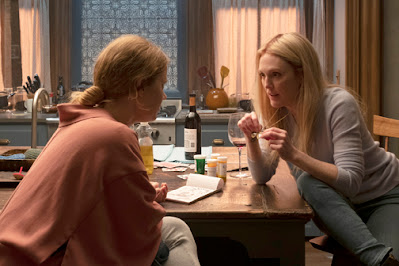This one should have been a slam-dunk, because the premise is irresistible.
And classic.
(Alfred Hitchcock certainly thought so, back in the day.)
 |
| Jane (Julianne Moore, right) proudly shows Anna (Amy Adams) a photo of her son, which she keeps in a locket. |
Trouble is, we’ll likely never see the film this team created.
The Woman in the Window became an orphan when its studio parent, Fox 2000, was absorbed by Disney in March 2019. (In a demonstration of childish behavior akin to Nature at her cruelest, takeover studios rarely embrace projects birthed by the vanquished “parent.”) Bowing to unfavorable test screenings, Disney demanded re-shoots and new material scripted by an uncredited Tony Gilroy.
What now has hit the screen is awkward, to say the least. And I can’t imagine this version is superior to what Wright and Letts delivered the first time.
New York City-based child psychologist Anna Fox (Adams), crippled by a severe case of agoraphobia, has been unable to leave her Manhattan brownstone for nearly a year. She’s trying to work this out via frequent sessions with her visiting psychiatrist, Dr. Landy (Letts, in a solid cameo).
He has put her through an ongoing cocktail of prescription drugs; the most recent, Elevan, comes with a strict warning not to mix it with alcohol. Which doesn’t stop Anna from drinking a lot of wine.
She’s estranged from her husband Ed (Anthony Mackie) and their daughter Olivia (Mariah Bozeman), although they chat daily on the phone. Anna also has the company of a tenant: aspiring musician David Winter (Wyatt Russell), who lives in the basement, runs errands for her, and handles odd jobs throughout the house.
Anna passes the time by watching classic film noirs — a brief clip from Hitchcock’s Spellbound is a bit on the nose — and observing the comings and goings in the buildings across the street, from the safety of her front windows. She therefore notices when a new family, the Russells, moves in directly opposite her brownstown. She’s charmed when 15-year-old Ethan (Fred Hechinger) pays a visit, to give Anna a “hello” gift from his mother.
Anna immediately senses that Ethan is oddly uncomfortable, perhaps distracted, for some reason he’s much too shy to share. They nonetheless part as friends.
Anna is similarly pleased when Ethan’s mother, Jane (Moore), stops by for a lengthy chat. They don’t exactly bond — Jane, unnaturally amused, seems to toy with her new neighbor — but Anna still appreciates the company.
Shortly thereafter, Anna is drawn to her front window by the sound of screams from across the street; she’s just in time to see Jane, bloody and terrified, apparently being murdered. Anna calls the police; detectives Little (Brian Tyree Henry) and Norelli (Jeanine Serralles) respond.
To her astonishment, Alistair Russell (Oldman) and his wife, Jane (now Jennifer Jason Leigh, in an improbable blond wig), insist that absolutely nothing is wrong. Norelli, noting Anna’s considerable medications, suggests — not at all kindly — that she hallucinated the whole thing.
And, truthfully, perhaps Anna did. Which she fully realizes.
We therefore have the ultimate unreliable narrator: a scenario that Wright and Letts develop deliberately, and rather chillingly. A scenario that demands — in order to be most effective — subtlety.
Which is almost completely absent here.
The ostentatious overacting isn’t merely distracting; it’s downright bizarre. Oldman is like Jack Nicholson, in 1980’s The Shining: a shrill, foaming-at-the-mouth lunatic, from the moment we meet him. Russell’s David initially seems like a pleasant, helpful fellow … until he suddenly becomes a spiteful, angry, suspicious Tenant From Hell.
Hechinger similarly exaggerates Ethan’s weirdness; he may as well be carrying a sign that reads “Warning: Troubled Teen.” Serralles’ Detective Norelli is too nasty, too judgmental, and far too quick to assume the worst of Anna; it doesn’t “read” persuasively.
If Wright had better control of his film, it could be argued that this is how Anna sees these characters, which isn’t necessarily the way they actually are. But that explanation doesn’t play here, because the tone doesn’t support it. We need the slowly developing confusion that overcomes Ingrid Bergman, in 1944’s Gaslight — which, yes, gave us the same-named form of psychological abuse — when, instead, we’re surrounded by burlesques playing to the back row of the second balcony.
Thank goodness for Henry, whose nicely understated Detective Little is a persuasive breath of fresh air. Moore also is excellent; her handling of Jane is quietly unsettling, even creepy.
The weight of dramatic intensity belongs to Adams, and she’s mostly successful; regardless of Anna’s state of mind, it’s essential that she remain a tragic figure who deserves our sympathy. Adams handles this reasonably well; our hearts break for Anna, when we move into the third act, as her sense of self, and grip on reality, begin to fray.
Wright and production designer Kevin Thompson also make the most of Anna’s claustrophobic and mildly sinister brownstone environment, thanks to the director’s fondness for sly tracking shots that seem to move through walls; kudos, as well, to cinematographer Bruno Delbonnel.
Danny Elfman’s score is equally effective, in terms of augmenting tension.
Alas, the film is undone by wretched acting excess, along with some exploitatively gory violence, during a climax that feels lifted from a cheap horror flick.
It’s impossible to know what went wrong, or when, but it sure feels like Disney — conspicuously absent, in the production credits — did its best to sabotage what I’ll bet was a far better film, when it initially left Wright’s hands.
No comments:
Post a Comment